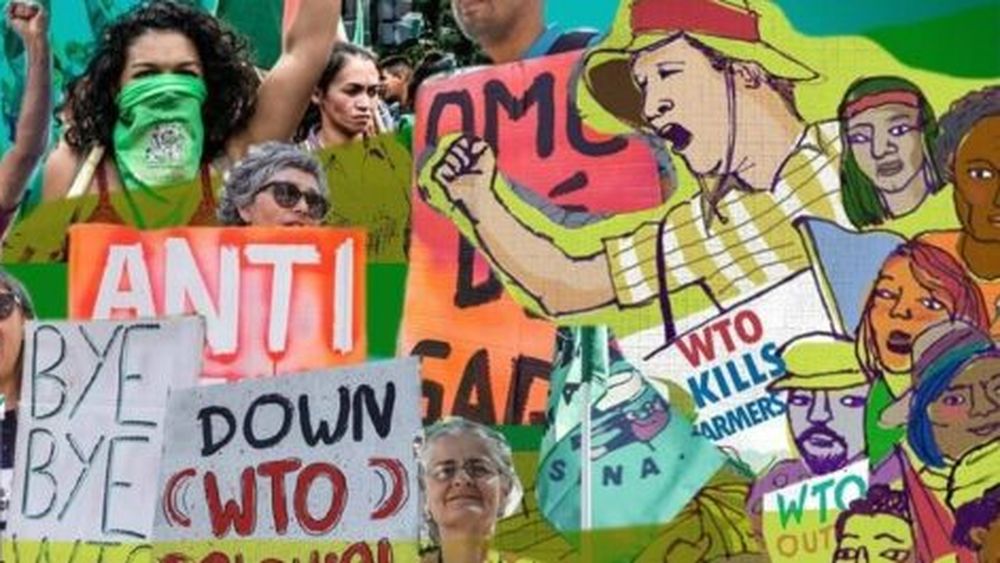La Via Campesina is determined to build an alternative framework for global trade in agriculture – written by the peasants, for the people
All the versions of this article: [English] [Español] [français]
La Via Campesina | 8 September 2023
Press Release: La Via Campesina is determined to build an alternative framework for global trade in agriculture – written by the peasants, for the people
La Via Campesina commemorates the International Day of Action Against the WTO and Free Trade agreements and announces that the endeavor to construct an alternative trade framework based on food sovereignty and solidarity among peoples, will commence in 2023 during the 8th International Conference in Bogota, scheduled for this December. This year coincides with the 20-year anniversary of the tragic passing of Lee Kyung Hae, who sacrificed his life outside the Ministerial meeting site in Cancun, Mexico.
08 September 2023 | Bagnolet: The World Trade Organization (WTO) has illustrated to the world how neoliberalism, privatization, deregulation, and a capitalist free-market economy can marginalize, exploit and dispossess the world’s most vulnerable communities – including peasants, indigenous populations, and rural and urban workers. Despite nearly three decades of existence, none of its promises have stood the test of time. Today, we inhabit a world plagued by severe inequality, poverty, patriarchy, hunger, violence, authoritarianism, chauvinism, and conflicts. To compound matters, a worsening climate crisis has led to unprecedented and catastrophic weather events that devastate our farms, forests, rivers, and oceans, gravely imperiling food sovereignty of our peoples.
This is the grim legacy the WTO has bequeathed us in its nearly thirty-year tenure.
Even the wealthiest countries and their corporations now acknowledge that the World Trade Organization teeters in a state of uncertainty. However, driven by their vested interests to safeguard their establishments and wealth, they employ various strategies to sustain neoliberalism – with or without the WTO. A few instances of these tactics include: secretive negotiations of bilateral and multilateral free trade agreements to ensure business as usual; the establishment of multi-stakeholder entities within the UN that deliberately sideline peasants and rural communities, while affording corporate lobbies unrestricted influence – masking their actions with talk of sustainability and promoting a dystopian vision of ‘farming without farmers’; substantial investments in marketing campaigns and biased research aimed at painting a rosy picture of a world where poverty, hunger, and inequality are purportedly disappearing.
Yet, as peasants who toil relentlessly in the fields to feed the world, our lived experiences are immune to their paid propaganda. We witness the appropriation and violation of our soil, biodiversity, and seeds by those in power. We observe how speculative trading, orchestrated by asset management firms, drives up food prices. We perceive how pandemic or conflict-induced supply disruptions can dismantle their global food supply chains in mere days. Despite these challenges, agribusiness giants continue to amass massive profits and distribute hefty CEO bonuses, while many struggle to afford three meals a day.
The evidence is as palpable as the air we breathe – the global trade system is fractured.
Should we, the people, desire a positive transformation, superficial alterations or an imagined “reform” of the WTO will not suffice. The remedy lies in a complete overhaul and the construction of a new global trade framework. This framework must honor countries’ food sovereignty, respect biodiversity, and uphold the rights of peasants and other rural and urban workers. It should be underpinned by values of solidarity, cooperation, people-to-people exchange, and internationalism, with the ability to dismantle the economic, political, social, and cultural dominance of select global north countries. It must stand as an anti-imperialist, anti-colonial, anti-patriarchal and pro-social justice, pro-feminist framework.
La Via Campesina is embarking on this endeavor in 2023, coinciding with the 20-year commemoration of Lee Kyung Hae’s sacrifice. The peasants, small-scale food producers, wage and migrant workers and indigenous communities of La Via Campesina will draft this framework, leveraging our collective knowledge of agriculture and food trade to ensure no one goes hungry.
This initiative serves as a tribute to Lee’s memory, as we strive to construct an alternative trade order for the world. In 2022, we appealed to global south nations for assistance in building this new framework, aiming for equitable and fair global trade founded on the principles of communitarianism and solidarity. We continue to implore governments worldwide to stand with us in this endeavor.
At the 8th International Conference of La Via Campesina in Bogota, Colombia, peasants from over 80 nations will convene to collaboratively develop this framework. Just as we constructed the UN Declaration for the Rights of Peasants and Other People Working in Rural Areas through years of patient negotiation and dedication, we will similarly construct this trade framework. This serves as our homage to Lee, whose life and struggle encapsulate the daily battles of peasants everywhere.
We are all Lee! A new trade framework is urgent and vital!






